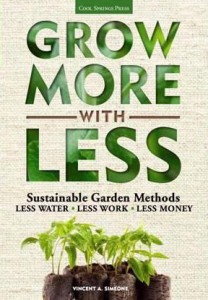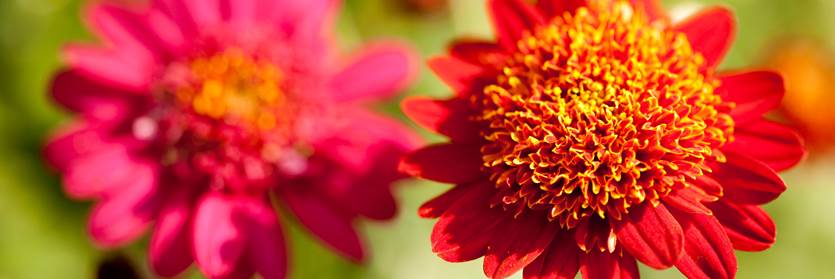Faculty Recognition: Vincent Simeone Grows More with Less
Posted in Adult Education on December 26 2013, by Lansing Moore
 Vincent Simeone is a well-respected horticulturist who teaches a number of plant-related courses in the Garden’s Horticulture Certificate program. He just released a new book, Grow More With Less: Sustainable Garden Methods (Cool Springs Press, December 2013), that offers the home gardener detailed and practical ways to create a sustainable home landscape with less work, less water, less money, and better results. Vincent graciously offered to share with us some tips from this valuable resource.
Vincent Simeone is a well-respected horticulturist who teaches a number of plant-related courses in the Garden’s Horticulture Certificate program. He just released a new book, Grow More With Less: Sustainable Garden Methods (Cool Springs Press, December 2013), that offers the home gardener detailed and practical ways to create a sustainable home landscape with less work, less water, less money, and better results. Vincent graciously offered to share with us some tips from this valuable resource.
Proper plant selection is very important. What will your book cover and is there one general tip you can share?
There is an entire chapter in the book dedicated to properly selecting the right plant for the right place and it encourages gardeners to think outside the box. This chapter offers some popular, tried and true favorites such as flowering dogwood and winterberry, along with some lesser-known species plants and new cultivars that extend seasonal interest and are low maintenance once established. The resurgence of native grasses such as Little Blue Stem and Switch Grass have raised the bar in the horticultural industry giving us many new possibilities that we didn’t necessarily have before. The key is to do your homework and purchase plants from a reputable plant source.
What is Integrated Pest Management, for those new gardeners who may not be familiar with the term? Why is it so important?
Integrated Pest Management (IPM) incorporates various forms of pest control methods, such as physically removing pests from plants, using beneficial insects, crop rotation, selecting pest resistant plants, and using less toxic pesticides to control harmful pest populations. The key to IPM is monitoring your landscape regularly and only using pesticides if you have to, not as a first course of action. IPM allows you to manage pest populations in the garden in a more eco-friendly way.
 We think of water conservation as more applicable to dry climates. But here in the Northeast, are there other benefits to conserving water? Do you have one tip to share about saving water?
We think of water conservation as more applicable to dry climates. But here in the Northeast, are there other benefits to conserving water? Do you have one tip to share about saving water?
Water conservation is very important because as climate change becomes more and more of an issue, so will water conservation. Being proactive now will enable us to better utilize water when we need it in the future during hot, dry summer months. Conserving water saves money and also reduces the harmful effects of run off. Proper watering of the garden, such as watering less frequently but for longer periods of time will create deeper, healthier plant roots that can better withstand periods of drought.
What role do native plants play in sustainable gardening?
Native plants are extremely important because they are so well adapted to the local climate and they serve an important role to pollinators and other wildlife that depend on them for food and habitat. Pollinators are vital to the health of the garden. We need pollinators for vegetable and fruit crops and to allow our favorite landscape plants to set seed and fruit. This natural cycle is important in a sustainable landscape.
What is one way that green gardening is more cost-effective?
Gardeners can save money and improve the health of their garden by making their own compost, which can be used as a natural form of plant food. By using fewer lawn chemicals, watering less often and cutting your lawn at higher lengths (3 1/2″), you can save time and money.
Finally, what do you hope readers will get from this book?
Readers will get a practical, hands-on guide on how to live a more eco-friendly lifestyle, while still having a beautiful garden.
Green-leaning gardeners and novices alike can find more information in Grow More With Less, available at NYBG’s Shop in the Garden. Or, save the date for Vincent’s step-by-step class on this topic starting March 21 as part of our Spring-Summer 2014 course catalog, coming in February.

